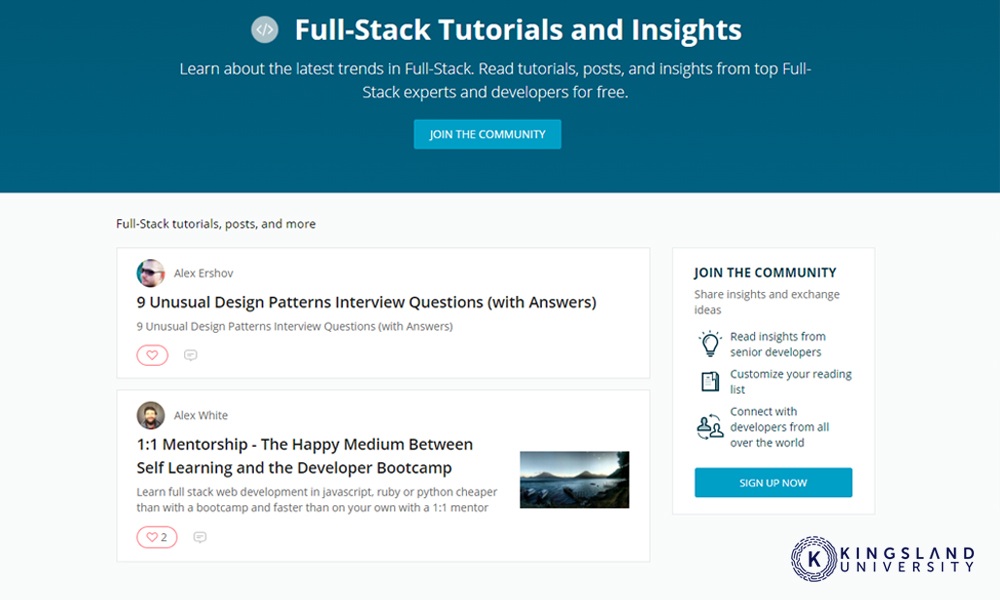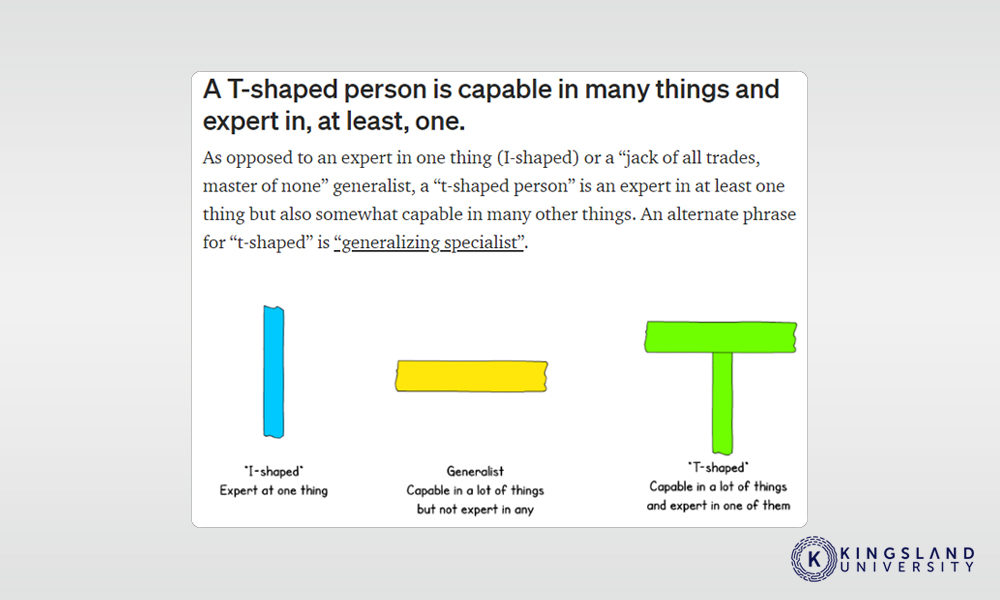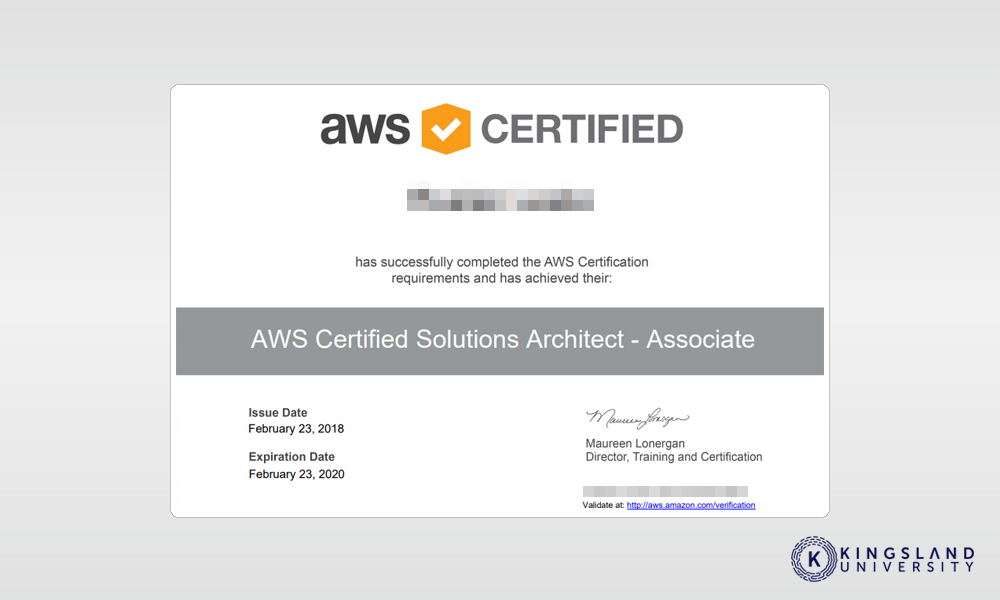
The world is in constant need of talented IT developers on the front end and the back end. As the internet grows, mobile devices surge in usage, and computer literacy becomes more and more common, there’s a growing need for the people who make the apps and platforms it all uses.
Companies are on the lookout for developers, but not just any developers. Specialists in the front-end, specialists in the back-end, they’re great, but what companies really want are the people who can do it all. The full-stack developers who know their way around an entire project are much more valuable than their limited-scope counterparts.
We’re not just saying it, either. Data from the Bureau of Labor Statistics bears it out. Among all of the possible careers in information technology, the full-stack developer is among the most in-demand. Job prospects are looking up, and a skilled full-stack developer can have their pick of dream careers.
The trick is getting there. We’re here to help. In addition to checking out our full-stack developer course, here are tips and tricks we’ve picked up along the way, just for you.
Learn a Range of Skills
Full-stack developers need to be well-versed in a variety of programming languages and frameworks, and that means learning a variety of different skills.
Some of the best options to start are JavaScript and Python. JavaScript is an excellent coding language for front-end development, and Python is a common and accessible option for back-end development. More importantly, learning both of them together allows you to see the underlying logic and construction of programming at its core.

From there, you can expand additional skill sets using what you already know. There are a variety of JavaScript-based frameworks and libraries, such as AngularJS and JQuery, which can pick up where you left off with JavaScript itself.
Here are some other recommendations for skills you might consider learning at least the basic and intermediate knowledge necessary to manage your way when a problem arises.
- Front-end development: picking up knowledge of HTML and CSS is near-essential to make a robust front-end interface.
- Programming: while Python is a good place to start, you may also want to learn other server-side languages, like Ruby and Java. Familiarity with .NET is also useful.
- Database management: Not everything is pure programming; sometimes you need to handle data and databases. MySQL, Oracle, SQLServer, and MongoDB are all good options here.
- Version control: Learn how to use Git. It’s incredibly useful for development in almost every situation.
- Design: While you don’t necessarily need a full education on user experience and design, reading a best practices and design document can be a good way to get a leg up on front-end design work.
- Server management: familiarizing yourself with the basics of server management through Linux and Apache servers helps a lot with future work.
While this might seem like a ton of different skill sets to pick up, all of them are interconnected and share a lot of the underlying logic and structures. When you learn how to program in a theoretical way, you know how math works, you know how objects are handled, you know logical cases. That knowledge applies regardless of what language you’re using, and from there it’s just about picking up the specifics of your environment and making the most of the language’s capabilities.
Take a Boot Camp
A common piece of advice for novice developers is to take a boot camp. Some courses run boot camps for 4-12 weeks, while more in-depth programs can last anywhere from 9-24 months and will teach you a complete set of skills in a given area from the ground up. There are hundreds of such programs out there, so there’s always a program somewhere that fits with your schedule, timing, and availability. It’s difficult to recommend any specific boot camp, however, simply because of how varied they are. Whether you’re doing a deep dive into a single programming language, a broad overview of an entire industry, or a more politically-focused boot camp aimed at democratizing technology, there’s something out there for you; you just have to find it.
Choose Your Boot Camp Carefully
One of the biggest problems with boot camps is the flood of people who take a boot camp and hit the job market, hoping to jump-start a career. The reality is, while a boot camp can be a great way to boost your knowledge and help you find a new career, it’s not always enough to land you in a high-end position.
If you’re going to look into boot camps, be sure to pick one that comes from a reputable source; a university, a well-recognized agency, or a company that has a history of providing quality education. There are definitely boot camps out there that look to take your money and provide you with little more than a textbook and a few rote assignments. As with anything educational, exercise caution and consider choosing an accredited university that specializes in your career path.

To that end, a boot camp can be a great place to start, as it will bolster your education and help you acquire the experience and certification that employers are looking for. You need more than just rote familiarity with a single language or framework to be successful with the full-stack. A good program should teach you beyond the basics, and into the concepts and core logic that allows you to succeed no matter the environment.
Find a Partner or Community to Join
Development can be a lonely role. When you’re tasked with managing the creation of a project entirely on your own, you can easily find yourself stuck with problems that other people may be able to solve in an instant.
In a professional environment, you’re likely to have other team members you can talk to about these kinds of situations, other experiences, and skillsets you can work with to solve issues. With the educational phase of development, it can be a great idea to network with others.
Join communities dedicated to development. Make friends. Post about questions you have, and answer questions you know the solution to. Make yourself part of a community and network with others.

As an added bonus, this can grow as you grow. Progressing from a beginner to a developer to a professional, you can learn from others at every stage. You can also potentially leverage these communities and friends for job opportunities down the road.
To be clear, a partner doesn’t necessarily mean someone you work with on everything. It means someone you can bounce ideas off, who can help troubleshoot and offer feedback, and who can help solve problems.
Pick a Specialty
The overall point of a full-stack developer role is being able to do anything that needs doing. The role of a full-stack developer is ever-changing, where you may be working on web development one day, database management the next, and server administration a week later. Being able to pivot and apply your knowledge across platforms and disciplines is the core of a good developer.
That said, it’s still worthwhile to choose a specialty. This gives you the flexibility of billing yourself either as a focused developer or as a full-stack developer, and suit the needs of whatever company you’re applying to or working for is looking for.

Start your education with experimentation. Play around in different fields, and figure out what is most appealing to you. You can learn the depths of one area, with a broad-level understanding and capability of solving problems throughout the rest of the industry. Building a T-shaped knowledge base is the best thing you can do for your future as a full-stack developer.
Look for Certifications
While “development” isn’t as codified as some other areas in internet technologies, you can still find certifications to help you learn and grow as a full-stack developer. Once you’ve figured out what kind of specialty you’re looking at, you can take specific courses and earn specific certifications to prove that you have the depth of knowledge you claim to have. This can be a good boost to your skills and to your self-confidence, and it makes companies more confident in their decision when they hire you.
What kinds of certs should you consider? There are hundreds out there, but some you might look at include:
- MTA: Microsoft Technology Associate. This is a certification that proves your experience and familiarity with the broader Microsoft ecosystem of technologies, including Windows administration, servers, and apps. It can also be a foundation to build into other Microsoft certs, including the MCSA and MCSE.
- AWS: Amazon Web Services Certified Developer. Amazon Web Services is one of the largest cloud platforms for developers in the world. Familiarity with it indicates a high degree of broad knowledge and skill in development, and Amazon offers a certification to test for that knowledge. It, along with the MCSD for Microsoft Azure, are two incredibly useful certs for full-stack developers.
- Oracle. Oracle controls Java, and Java controls a lot of the programs and apps in use today. Oracle offers several levels of certification, simply named the Oracle Certified Associate/Professional/Expert/Master, scaling in requirements.
- CSD: Certified Scrum Developer. Scrum is an alliance of tech organizations that promote a specific ideology, particularly based around Agile development. A Scrum developer proves their knowledge within both common technologies and ideologies, which can be very valuable for companies that buy into those ideologies throughout their organization.

Regardless of which certifications you get, they’re never going to lock you out of anything. Consider a certification a way to codify and prove your knowledge. You’re never stuck on a given path or locked into a role just because you earn a cert. Rather, you leverage those certs to build more knowledge and experience, guiding your own path.
Make Something Yourself
Industry surveys often indicate that the best developers are the ones who are self-interested and self-motivated. When you’re passionate and self-taught, you can innovate where traditional values would claim there’s no room for innovation.
One of the best ways to teach yourself skills, synthesize knowledge, and prove your interest in development is to make something yourself.
You don’t need to be the next Bill Gates or the next Elon Musk. Building something doesn’t mean building something big. Put together a simple applet to help you with your daily tasks. Build code that streamlines tasks you do every day or every week. Look for a problem people have and see if you can solve it.

You might run into roadblocks. You might not know the right things; that’s great! Teach yourself what you don’t know, or look for ways to learn. You might discover that a problem is a lot more complex than you thought at first, and that’s fine! It gives you insight into how complicated development is, and the problems you’ll be tasked with solving as part of developing an app.
Making something, and having proof of making something, is a great way to get hands-on experience with development, tell stories about your failures and your successes, and build solutions to problems, and showcase your skills.
Consider if Development is Right for You
At the end of the day, one thing you might discover through a boot camp or through a programming course is that, well, programming just isn’t for you. Sure, the draw of a high-paid technical position can be enticing, but programming is a complex and technical field. Not everyone has what it takes to succeed in the field.
That said, there are a lot of other roles in the broader world of tech that still need doing. A full-stack developer can handle a lot, but they can rarely do everything. You can always consider related fields, such as cybersecurity, program management, quality assurance, data analyst, journalism, and accounts management, among others.
By all means, take a course to experience what you need to learn to be a full-stack developer. If it doesn’t feel right, and if it doesn’t work out, there’s no shame in it; you can pivot to a related career just as easily.
Are there any additional tips that we may have missed? Be sure to leave us a comment down below if you have anything additional you would like to add!


